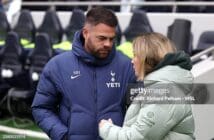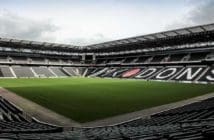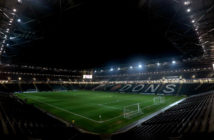It would be fair to say the majority of Premier League eyes were firmly fixed on Old Trafford on Saturday afternoon, but a meeting of two stories worthy of equal attention was taking place at the Brentford Community Stadium.
Cristiano Ronaldo’s second Manchester United debut followed the script with the forward scoring twice to secure a convincing win against Newcastle United, and even though Leandro Trossard’s late goal for Brighton against Brentford means the Seagulls now have the same number of wins as Ole Gunnar Solksjaer’s side so far this season, it was factors surrounding the game that deserved greater attention.
It is not so much an impressive result for Brighton that should be considered noteworthy, but rather the fact that these two teams are facing off in the top flight of English football for the very first time.
Both have risen from the bottom tier of the Football League over the past 20 years, thanks in no small part to a pair of owners who are more similar than either would probably care to admit, which perhaps explains why the two clubs now operate in fairly similar ways in regards to recruiting players, coaches and staff behind the scenes.
They have also both experienced a sizeable amount of heartbreak in the play-offs before reaching the promised land, and the first meeting between the sides at Brentford’s new home at the weekend should be seen as a landmark moment for supporters of the Bees and the Seagulls after they battled against problematic owners to play their part in helping to secure state-of-the-art stadiums fit for top-flight football.
Before Brighton’s promotion from the Championship in 2017, the two clubs had only spent nine years in the English first-tier between them, and both have had to overcome their fair share of adversity before reaching the top flight.
The Seagulls avoided dropping out of the Football League in 1997 thanks to a draw on the final day of the season against Hereford United after more than a decade of off-field mismanagement. Despite the relief of escaping potential financial ruin, the club’s problems were far from over due to the ownership legacy of majority shareholder Bill Archer.
Archer and his fellow directors had already made the decision to sell off the historic Goldstone Ground in order to pay off outstanding debts, leaving the Seagulls playing their home games 74 miles away at Priestfield Stadium, the home of Gillingham.
A return to Brighton was secured in 1999, but the club were forced to play at the Withdean Stadium, leading to years of fan protests that went as far as pressuring Deputy Prime Minister John Prescott into granting a consortium led by lifelong supporter Dick Knight planning permission for a new stadium.
Despite the goals of Bobby Zamora firing the Seagulls to consecutive promotions at the beginning of the 21st century, on-field success was fleeting and largely overshadowed by the grim reality of trying to make a ground that had no business hosting football matches into some sort of home.
By the summer of 2009, Brighton found themselves in the lower reaches of the League One table, a fair distance from Premier League wins at Anfield and the Emirates or £20 million signings.
Whilst Brentford have not come quite as close to dropping into non-league football over the past 25 years or so, they have undeniably had their own issues with inadequate management at the top of the club.
Former Crystal Palace owner Ron Noades purchased the club in 1998 after they had just dropped into the fourth division and immediately installed himself as manager of the first team.
Although he did help secure promotion at the first time of asking, attempts to move the club from Griffin Park to Woking, coupled with an embarrassing FA Cup defeat to non-league Kingstonian, made Noades widely unpopular in the red and white part of West London.
He was eventually forced to take a step back, resigning as both manager and chairman but still retaining ownership of the club as the Bees largely floundered at the wrong end of what is now League One before relinquishing control to a newly formed Supporters’ Trust in 2003.
It is not only narrowly avoiding tragedy that unites these two clubs though. There is also a bitter personal spat between the two men who currently own them that runs so deep that Brighton owner Tony Bloom shunned an afternoon in the corporate suites at Saturday’s game in favour of the away end among the Brighton fans.
Bloom and Brentford owner Matthew Benham both made their fortunes in the world of professional gambling, even working together when Benham joined Bloom’s betting company, Premier Bet, as a trader in 2001. That relationship lasted for three years before Benham left to set up his own analytics-based betting syndicate, Smartodds.
It has been suggested that a fallout of epic proportions either caused Benham to move on or has been the root cause of the animosity between the pair that has followed, but even if they have not remained in close contact, their approaches to guiding their boyhood clubs towards success have been noticeably similar.
Bloom became Brighton chairman in 2009 after securing a 75% controlling stake in the club and investing £93million into a proposed new stadium project in the village of Falmer.
He appointed former Chelsea and Tottenham midfielder Gus Poyet as manager in the same summer, and by the time the 30,000 capacity Amex Stadium was opened in 2011, the Uruguayan had guided the club back to the Championship for the first time since relegation in 2006.
2013 saw the Seagulls lose out in the play-off semi-finals to fierce rivals Crystal Palace, and they fell at the same hurdle against Derby County in Oscar Garcia’s solitary season as manager the following year.
Chris Hughton looked destined to end the club’s 33-year wait for top-flight football only to miss out on automatic promotion to Middlesbrough on the final day of the 2015/16 season before falling short in the play-offs once again, this time to Sheffield Wednesday.
They made no mistake in the following campaign though. 23 goals from striker Glenn Murray, a final tally of 93 points, and a group of players that were fiercely loyal to Hughton and committed to his methods secured promotion without the need for another appearance in the play-offs, and the Seagulls were only denied the league title after conceding a late goal to Jack Grealish at Villa Park on the last day of the season.
Benham had originally been a ‘mystery investor’ providing funds for the Brentford Supporters Group Bees United to buy the club from Noades, but in 2012, he was offered the chance to buy the club outright by the Trust.
He immediately implemented a club-wide philosophy that was largely guided by statistical data, inspired by the principle of ‘Moneyball’ that had allowed less wealthy baseball teams to punch well above their weight in the American Major League.
The similarities in the backgrounds of Benham and Bloom mean it should be no real surprise that both have overseen revolutions in terms of recruitment that have made Brighton and Brentford the envy of overspending clubs both in England and further afield.
Although the Brighton side that won promotion to the Premier League in 2017 under the management of Hughton was largely made up of established Championship performers in the shape of Shane Duffy, Lewis Dunk, Anthony Knockaert and Murray, the change in the profile of their signings since becoming regulars in the top flight has drawn greater attention.
In Yves Bissouma, Pascal Gross and Tariq Lamptey, Brighton have quietly acquired some of the most effective players in the Premier League, and in Graham Potter, they appear to have found the ideal head coach to both improve them and successfully utilise them on a weekly basis.
Benham’s shift to a reliance on analytics was a more sudden and obvious process. It was understandable given he had already effectively tested the Moneyball concept through his ownership of Danish club FC Midtjylland, but the number of plaudits directed towards the club have reached new levels over recent seasons.
Mark Warburton guided the club into the second tier and subsequently reached the play-offs in 2015, and Dean Smith continued the process of developing undervalued players in the shape of James Tarkowski, Andre Gray and Scott Hogan before selling them on for sizeable profit, but both on-field glory and success in the transfer market have reached new heights under current head coach Thomas Frank.
Brentford should really have secured a place in the top flight at the end of the 2019/20 season, twice passing up opportunities to secure automatic promotion before losing out in the play-off final to Fulham. They ended up moving on two of their outstanding performers on the back of that defeat in Ollie Watkins and Said Benrahma, securing over £50 million for them after initially investing £8 million to secure their signatures.
Watkins had scored 26 goals in helping the Bees reach Wembley, and he had only begun playing as a central striker on the back of Neal Maupay’s £20 million move to Brighton at the start of the campaign, the Bees had acquired the Frenchman for less than £2 million in 2017.
Even more remarkably, Brentford spent just a fraction of the fee received for Watkins on his replacement Ivan Toney. The ex-Peterborough United forward broke the Championship record for goals scored in a 46-game campaign in 2020/21 after finding the net 31 times in the regular season, helping Frank and his teammates secure promotion by scoring twice more in play-offs.
Last season was Brentford’s first at their new home, having made the difficult decision to leave Griffin Park in order to play in a stadium more suited to the demands of the Premier League.
Even though Tony Bloom was reluctant to experience the hospitality on Saturday, the meeting between Brentford and Brighton was only the second game played in front of a capacity crowd at the Brentford Community Stadium. It is somewhat fitting that it took place against a rival that they share so many similarities with, and also highlights how rich a tapestry the story of the Premier League currently is.
Under the guidance of two owners who appear to be similar enough to not be able to stand one another, both clubs have staved off the potentially ruinous actions of previous custodians, climbed the football pyramid by appointing innovative managers and utilising the transfer market effectively, and they are both now playing top-flight football in stadiums fit for the Premier League.
Brighton celebrating a fifth consecutive season at this level will perhaps inspire belief at Brentford that extending their stay in the Premier League will not be an impossible task, and given the successful starts to the campaign that both clubs are enjoying, it would be no surprise to see top-flight meetings between the two clubs become a regular occurrence.
Follow us on Twitter @ProstInt
Apologies, but no results were found for the requested archive. Perhaps searching will help find a related post.EPL
Brighton and Hove Albion
Nothing Found
![Prost International [PINT]](https://prostinternational.com/wp-content/uploads/2021/08/PINTtFontLogoRoboto1536x78.jpg)


